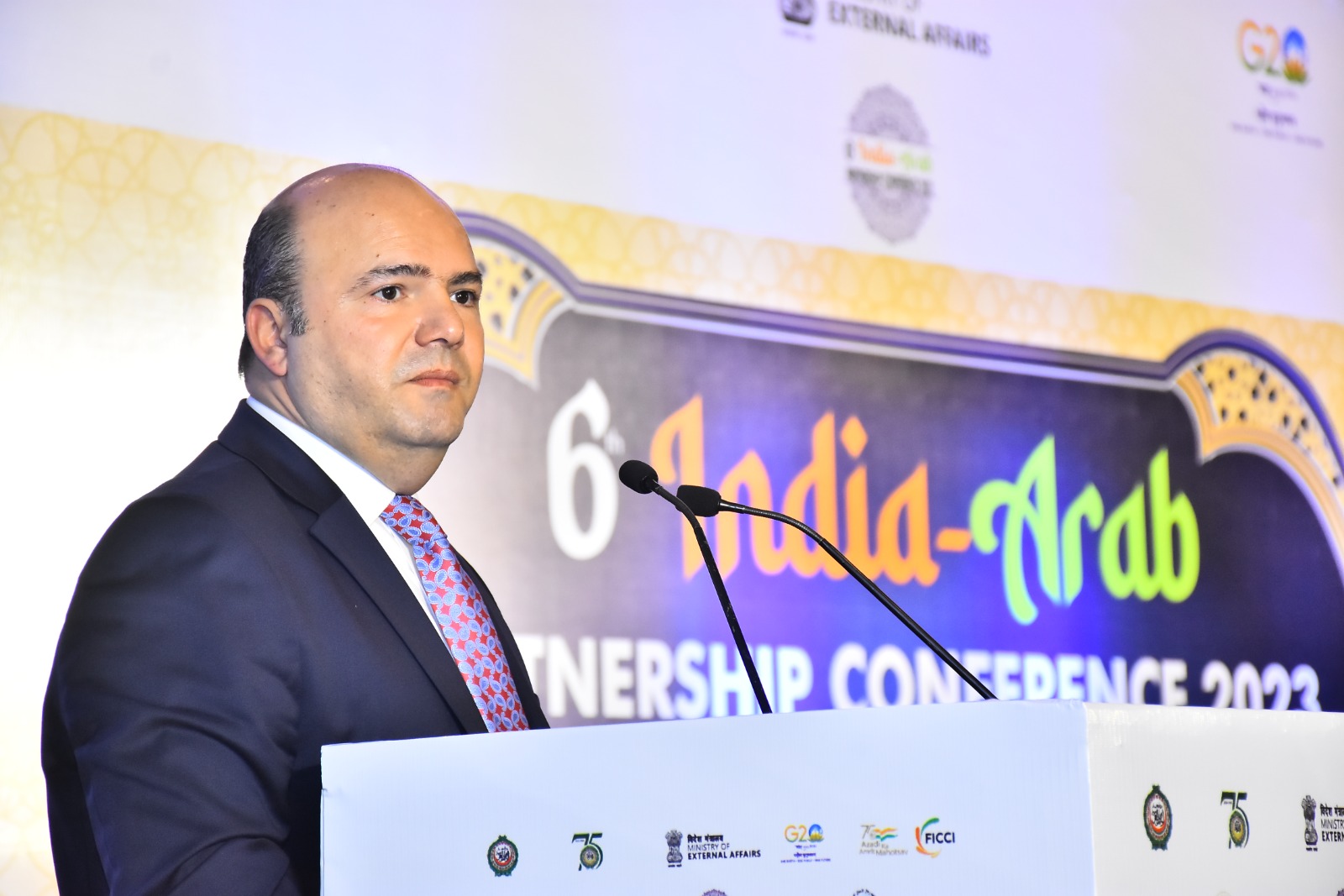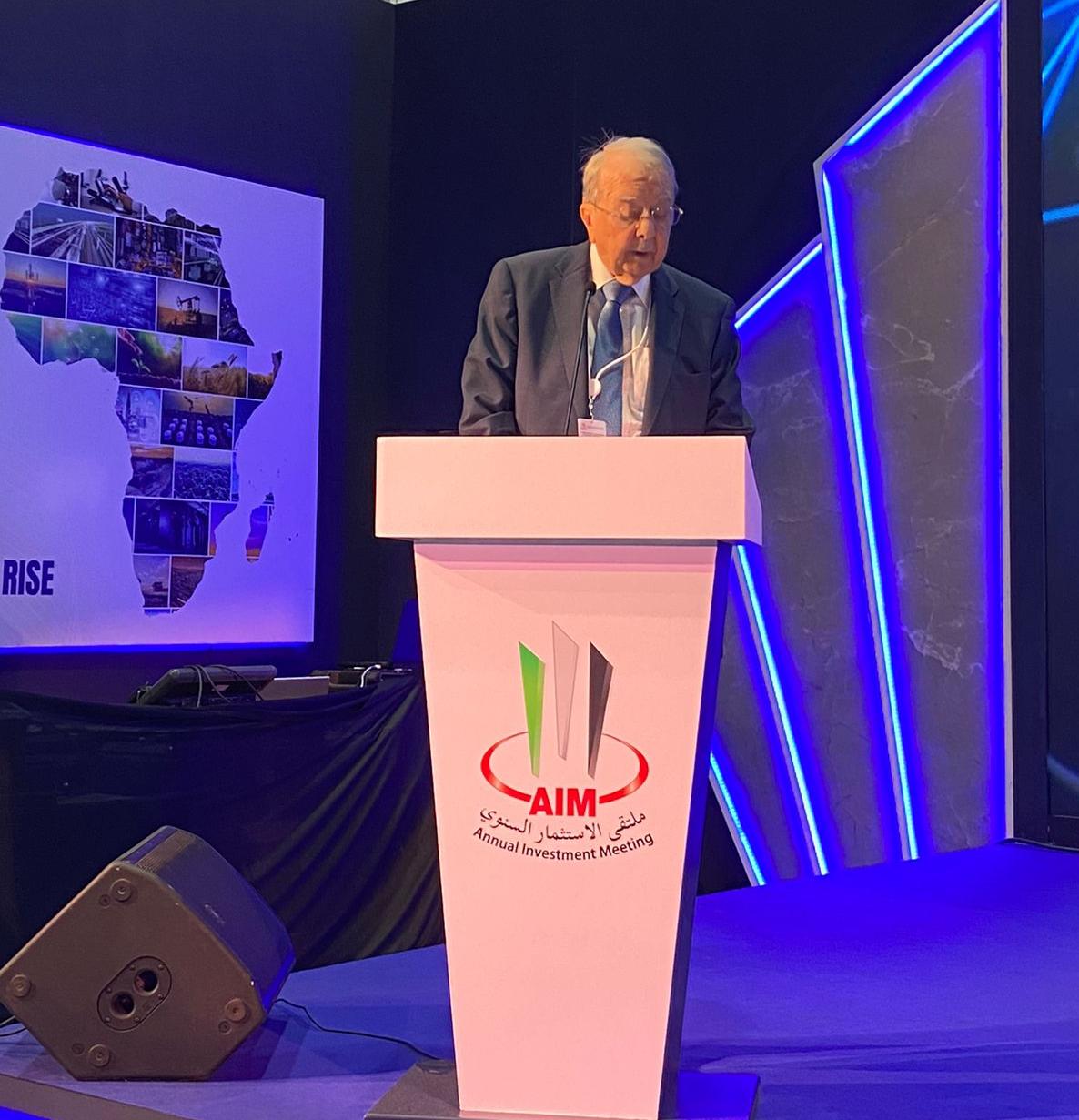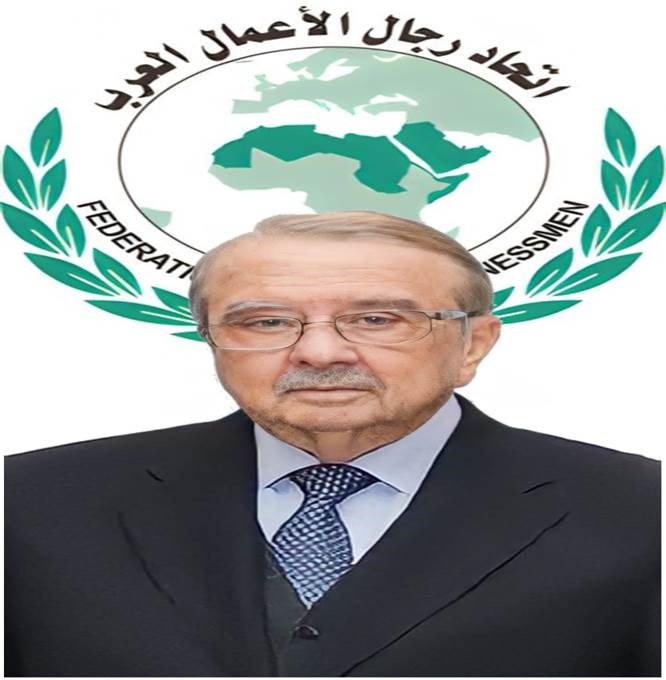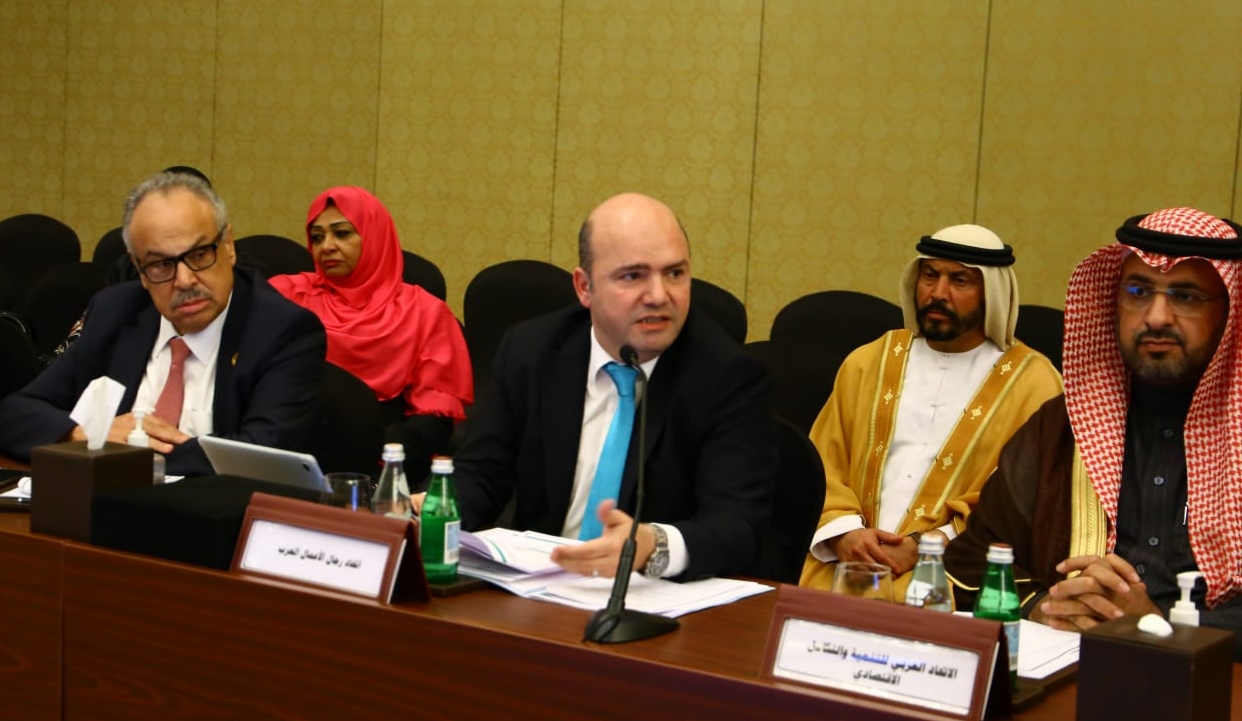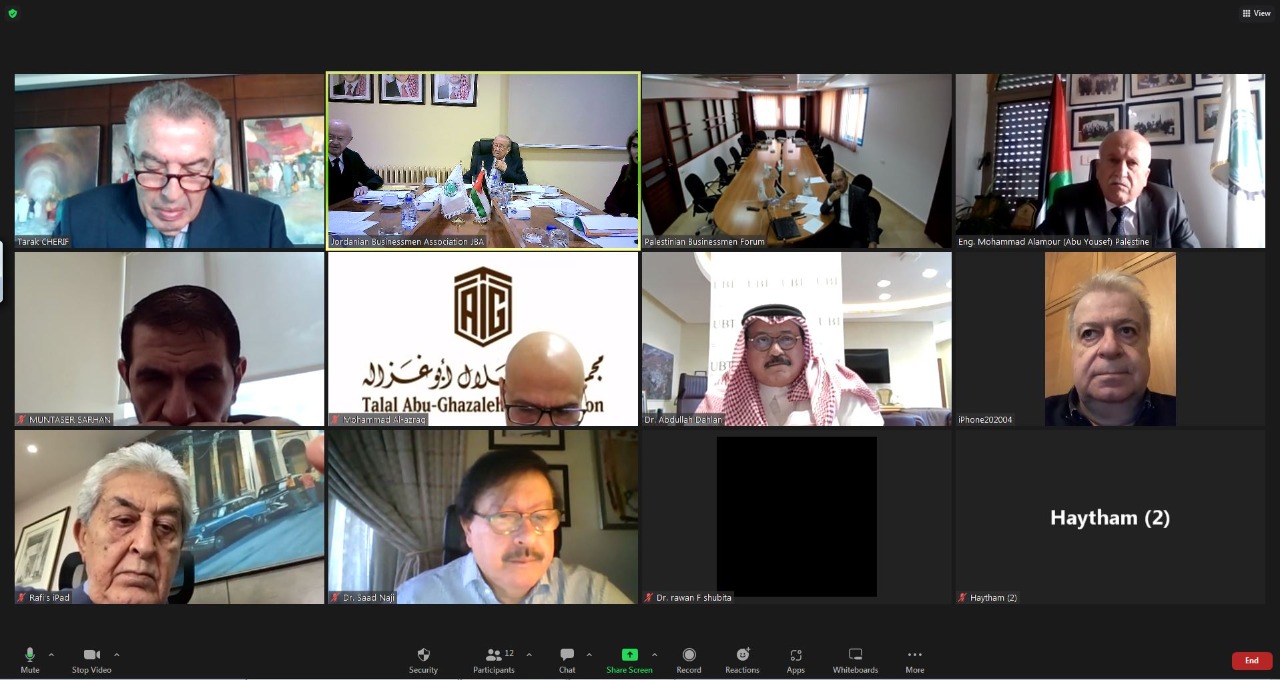

H E Mr. Hamdi Tabbaa President of the Federation of Arab Businessmen chaired the Delegation that participated in the fourth Round of the Arab and Chinese businessmen Conference, which was inaugurated at the morning of Wednesday, January 18, 2012 in Sharjah in the United Arab Emirates under the auspices of His Highness the Ruler of Sharjah Sheikh Dr. Sultan bin Mohammed Al Qasimi, member of the Supreme Council and Ruler of Sharjah.
His Excellency Mr. Hamdi Tabbaa addressed the opening session reviewing the Arab Chinese economic relations and the opportunities of cooperation between the two sides in various economic sectors to achieve their common interests.
HE Sheikha Lubna Al Qasimi, Minister of Foreign Trade, in the United Arab Emirates and HE Wen Jiabao, Minister of the Council of Chinese State (Prime Minister) and Mr. Givi Chairman of the Chinese Council for the Promotion of International Trade have participated in the opening session of the Conference.
In his speech HE Tabbaa mentioned that the conference is held under very intricate and complex international, regional and Arab circumstances, where the whole world and Arab Region are witnessing harsh political and economic situations that summarized as follows:
The continuity of repercussions of the global economic crisis in America and the rest of the world where the series of bankruptcies of banks, insurance, and investment companies as well as the losses of capital markets is still going besides the difficulty of addressing this Crises.
The decline in the debt rating of America and the growing deficit in the balance of trade and peoples protests in most U.S. A. Cities against the decline of living standards and the confiscation of homes by creditor banks. We bear in mind that China is the largest creditor country to America.
The decline in the European economic situation to witness the worsening of the European debt and the decrease in the rating of debts of several countries in the forefront of which Greece, Spain and Portugal, the declining rating of French debts as well as the decline of the exchange rate of the Euro in global money markets. Note that China is prime lender for European countries.
The tough trade competition between China and America in light of the continued increase trade surplus in favor of China and the U.S.A. repeated claims for China to raise the exchange rate of its currency in order to reduce the Chinese trade competition.
The continuation of the Arab popular political movement since the end of last year Which is accompanied by social and political unrest, and led to a negative impact on Chinese investments in these countries, particularly in sectors oil and gas.
The deterioration of economic conditions in all Arab countries, which witnessed and in those witnessing political movements that reflected negatively in the infrastructure, Arab stock markets losses, the stop of tourism and the deterioration in the rates of economic growth rates, irregularity of production activity, increase in prices and rates of unemployment, the worsening of debts, the tangible decline of inter- Arab trade and investments and other negative effects witnessed by Arab economies. Also, other Arab countries as well were negatively affected but to a lesser degrees.
On the other hand, the President of the Federation of Arab businessmen added that on the contrary there is a boom in emerging economies such as China, India, Brazil, Russia and South Africa which witnessing growth at higher rates than those in the American, European and Arab economies and thus increasing their contribution substantially in the global economy particularly in the realms of finance, trade and investment. Under these facts, it could be said that the international scene portends the occurrence of a new and deep global financial crisis that topple all the efforts made over the past two years to get rid of the effects of the crisis of 2008, to achieve sustainable development, combat poverty and unemployment and improve living standards of citizens of all segments.
Then HE Mr. Hamdi Tabbaa added that in spite of unfavorable conditions in the Arab region and the world alike, the economic cooperation between China and Arab countries made positive and accelerated progress in the areas of bilateral trade, contracting projects and cooperation in the field of labor, mutual investments and personnel training.
The Chinese and Arabic economies have become labeled as integrated to a large extent. The Arab States at the present time have become the seventh largest trade partner of China. Add to that, the Arab countries markets are the fastest markets which witness an increase in the external cooperation with Chinese enterprises. The total trade volume between China and Arab countries amounted to about $ 145 billion in 2010. The volume of trade reached a recorded of 120 Billion dollars in the first half of this year. The volume of mutual investments between the two parties continued its expansion, where China has already invested more than $ 15 billion dollars y in the Arab countries till the end of last year, while the total value of Arab investments in China came to 3 billion U.S. dollars.
Therefore, this conference is aimed at the development of Arab-Chinese relations and the consolidation of commercial and investment relations between China and the Arab world in order to achieve common interests against the harmful implications and consequences of regional and global economic crises.
The Chinese -Arabic cooperation frameworks are multiple and wide, and under the overwhelming economic and political conditions, I propose that the conference may seek to achieve the following objectives:
Cooperation in the reconstruction of the Arab economies affected by the disturbances in a number of Arab countries.
Chinese contribution in the rehabilitation of the oil sector in Libya, Sudan and Yemen.
Stimulating and activating Arab-Chinese trade in both directions through the agreements concluded between China and Arab countries and increase the number and size of Arab exported goods to China.
Adoption of the Arab states by China as most favored states in trade and investment.
Intensification of the Arab-Chinese cooperation in the fields of energy, technology and scientific research and vocational training.
China’s adoption of advanced and effective assistance program for the Arab economies and directed towards rehabilitation and support of Arabic intensive labor industries, infrastructure development in addition to raising the efficiency of trade and business organizations and business.
The Arab-Chinese Cooperation could cover all economic sectors such as trade, industry, agriculture, water, energy, construction, transport, mining, banking, infrastructure projects and construction of roads, bridges, ports, tunnels, housing and towers as well as small and medium enterprises, and others. Also real cooperation can be conducted in the social sectors as tourism, environment, vocational training, specialized education, technology, health, and social and knowledge economy and information technology. There is no doubt that the success of Arab-Chinese cooperation can be ensured by good faith intentions and the will to push this cooperation forward wider horizons, accelerate the implementation of what we agree upon without delay and remove the obstacles that hinder the achievement of our goals and our visions for a better future for our generations to come.
It is worth mentioning that the Federation of Arab businessmen is one of the organizers of this series of Arab-Chinese cooperation conferences in cooperation with the General Secretariat of the League of Arab States (CCPIT). The Federation of Arab businessmen had hosted the second round of the conference in Amman in 2007.

